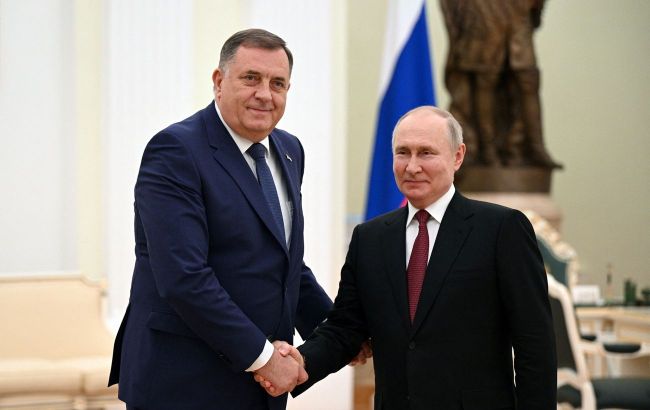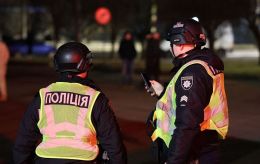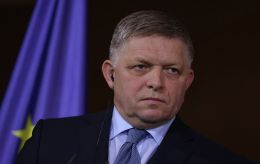Russia increasing its influence in Western Balkans, and here is why - Bloomberg
 Photo: Milorad Dodik and Vladimir Putin (Getty Images)
Photo: Milorad Dodik and Vladimir Putin (Getty Images)
Russia is increasing its influence in the Western Balkans, as Bosnia and Herzegovina's accession to the EU has stalled, reports Bloomberg.
Previously, the President of the Republic of Srpska, Milorad Dodik, who has close ties with Russia, announced his readiness to declare the independence of the region from Bosnia and Herzegovina.
"The declaration, which stirred memories of the brutal ethnic cleansing that took place in the region nearly three decades ago, came just a month after the European Commission declined to recommend accession talks with Bosnia-Herzegovina," the article states.
Bloomberg writes that in a country considered the hottest spot in Europe after Ukraine, the decision of the European Commission has become a gift for political players such as Russia, who seek to provoke instability.
Dodik obstructs the integration process of Bosnia and Herzegovina into the EU
The Dayton Peace Accords ended a four-year war in which over 100,000 people died, but they also froze a demographic divide in the country.
The Serbs, who make up the majority of Orthodox Christians, were given a land parcel along the western and eastern borders, known as the Republic of Srpska, while the federation of Muslims and Croats received roughly equal territory in the southwest.
These two entities are loosely united by a weak central government and a rotating presidency of three individuals, each elected from one of the groups. Since all constitutional changes require consensus, such a structure allows any ethnic leader to hold Bosnia's EU accession process hostage.
Officials in Bosnia and Herzegovina claim that Dodik has refused to implement the necessary reforms to move forward unless his own demands are met.
Dodik has good relations with Putin.
Their close ties, with Dodik frequently visiting Moscow, have yielded dividends for both," the material states.
In the city of Banja Luka, Russia is assisting in funding the construction of a Russian-Serbian temple and cultural center.
Previously, Dodik claimed that the Russian leader Vladimir Putin knows that he "should thank the Republic of Srpska for Bosnia's inability to impose sanctions against Russia.
EU leaders express concerns
Latvian President Egils Rinkēvičs stated that the inability to achieve closer ties between the Western Balkans and the European Union has increased Russia's influence in the region and made the EU more vulnerable.
Austria's Minister of Foreign Affairs, Alexander Schallenberg, also asserted that Bosnia should be treated on par with Ukraine, which is progressing in the accession process. The publication notes that other neighboring countries may soon face similar challenges.
The situation in the Republic of Srpska
In July, the President of the Republic of Srpska, Milorad Dodik, openly signed a separatist law refusing to publish acts and laws of Bosnia and Herzegovina in the Republic of Srpska, which sparked sharp criticism from the High Representative of the International Community, Christian Schmidt. Dodik annulled two laws that ignored the provisions of the Constitutional Court of Bosnia and Herzegovina.
The United States imposed sanctions against two individuals and four companies that constitute a significant part of the patronage network of President Milorad Dodik.
In August, it was reported that Milorad Dodik faced charges of disregarding decisions by international officials, and he could face imprisonment.

